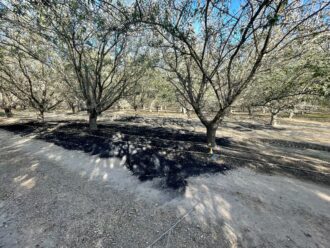As the California agricultural community seeks new tools and practices critical for adapting to a changing climate, the American Farmland Trust partnered with a Madera County almond grower, conservation districts, and the University of California at Merced to conduct a field demonstration project and experiment on the application of biochar and its effects on soil health. Specifically, that project explored two biochar types applied at two rates and the effects on available inorganic nitrogen and greenhouse gas fluxes.
After seeing positive results, graduate student Evelyn Perez-Agredano proposed expanding on the project to better inform growers on best management practices. Her project continues the on-farm research in addition to a lab incubation study.
Matt Angell, whose farm is part of the trial explains, “Healthy soils are essential to meeting many of my goals, including sustained production, groundwater sustainability, and climate change mitigation.”
After the application of biochar produced from almond shells and orchard prunings, Perez-Agredano and her team have observed to date substantial carbon sequestration, as well as a decrease in methane. Perez-Agredano is replicating this almond orchard research to explore the effects of biochar in orchard soils under two water-availability scenarios and higher temperatures.
Says Perez-Agredano, “Our current findings show that the application of biochar has the potential to lower the soils contribution to global warming.
One management recommendation so far is to apply the biochar when wet, as this helps mitigate pollution and health risks, as well as the risk of combustion when applied at a high rate.
The lab incubation study uses growth chambers to measure the separate and combined effects of biochar with cover crops on soil properties and plant productivity under elevated temperatures and CO2 enrichment.
The 7,600 almond farms in California face substantial challenges such as shortened growing seasons and reduced harvests due to climate change. Because of these challenges, Perez-Agredano states that many almond growers in California’s Central Valley are extremely interested in the data collected so far and becoming aware of challenges with biochar application.
“We hope to demonstrate the role of biochar on orchard soil health and resilience to climate change and to generate new knowledge to inform safe and effective practices for biochar use in agricultural ecosystems,” says Perez-Agredano.
Outreach will include an extension publication for the American Farmland Trust’s Information Center addressing gaps between farmer awareness and current recommendations on biochar application in orchard systems and sharing developed best management practices to farmers at events, including a Spanish language workshop.
Speaking to Western SARE’s graduate student program specifically, she states she chose to apply because of the program’s focus on educational objectives. “It’s important to communicate our findings directly to those who most benefit, especially farmers.”
